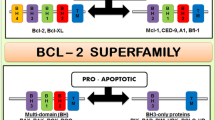Abstract
We have investigated the effects of transient Bcl-2 down-regulation induced by the Bcl-2 antisense oligodeoxynucleotide (ODN) G3139 (Genta Incorporated) in high Bcl-2 protein expressing, estrogen receptor (ER) positive MCF-7 and low Bcl-2 expressing, ER negative MDA435/LCC6 human breast cancer cells. Treatment with Bcl-2 antisense ODN in vitro caused > 80% reduction of Bcl-2 protein levels in a sequence specific manner for both cell lines. Maximum mRNA reduction was achieved within 24 h of the first antisense ODN exposure whereas full protein down-regulation required antisense exposure over 48 h. This Bcl-2 reduction was associated with 80–95% loss of viable cells compared to untreated cells. Similar cytotoxic effects were observed in both cell lines despite a nine-fold intrinsic difference in Bcl-2 protein expression suggesting that the relative degree of down-regulation of Bcl-2 is more important than the absolute reduction. Cell death associated with G3139 exposure exhibited properties indicative of apoptosis such as mitochondrial membrane depolarization and caspase activation. Combined treatment with G3139 and cytotoxic agents resulted in additive cytotoxicity in both cell lines. However, under most conditions studied, the direct cytotoxic activity of G3139 antisense was not synergistic with the cytotoxic agents. These results suggest that while Bcl-2 clearly constitutes an attractive therapeutic target due to its role in regulating apoptosis in breast cancer cells, additional mechanisms are important in the control of apoptosis arising from exposure to anticancer agents in vitro.
Similar content being viewed by others
References
Reed JC: Prevention of apoptosis as a mechanism of drug resistance. Hem Onc Clinics North Am 9: 451–473, 1995
Teixera C, Reed JC, Pratt MAC: Estrogen promotes chemotherapeutic drug resistance by a mechanism involving Bcl-2 proto-oncogene expression in human breast cancer cells. Cancer Res 55: 3902–3907, 1995
Vaux DL, Cory S, Adams JM: Bcl-2 gene promotes hematopoietic cell survival and cooperates with c-myc to immortalize pre-B cells. Nature 335: 440–442, 1988
Decaudin D, Geley S, Hirsch T, Castedo M, Marchetti P, Macho A, Kofler R, Kroemer G: Bcl-2 and Bcl-XL antagonize the mitochondrial dysfunction preceding nuclear apoptosis induced by chemotherapeutic agents. Cancer Res 57: 62–67, 1997
Miyashita T, Reed JC: bcl-2 gene transfer increases relative resistance of S49.1 and WEHI7.2 lymphoid cells to cell death and DNA fragmentation induced by glucocorticoid and multiple chemotherapeutic drugs. Cancer Res 52: 5407
Burkhard J, Schlagbauer-Wadl H, Brown BD, Bryan RN, van Elsas A, Muller M, Wolff K, Eichler HG, Pehamberger H: bcl-2 antisense therapy chemosensitizes human melanoma in SCID mice. Nature Med 4: 232–234, 1998
Ziegler A, Luedke GH, Fabbro D, Ahmann KH, Stahel RA, Zangemeister-Wittke U: Induction of apoptosis in small-cell lung cancer cells by an antisense oligodeoxynucleotide targeting the Bcl-2 coding sequence. J Natl Cancer Inst 89: 1027–1036, 1997
Cotter FE, Johnson P, Hall P, Pocock C, al Mahdi N, Cowell JK, Morgan G: Antisense oligonucleotide suppress B-cell lymphoma growth in a SCID-hu mouse model. Oncogene 9: 3049–3055, 1994
Yang D, Ling Y, Almazan M, Guo R, Murray A, Brown B, Lippman ME: Tumor regression of human breast carcinoma by combination therapy of anti-bcl-2 antisense oligonucleotide and chemotherapeutic drugs (Abstract). Proc Amer Assoc Cancer Res 40: 4814, 1999
Tolcher A, Miyake H, Gleave ME: Downregulation of Bcl-2 expression by antisense oligonucleotide (AS-ODN) treatment enhances mitoxantrone cytotoxicity in the androgen dependent Shionogi tumor model (Abstract). Proc Amer Assoc Cancer Res 40: 3198, 1999
Reed JC, Stein C, Subasinghe C, Haldan S, Croce CM, Yum S, Cohen J: Antisense-mediated inhibition of BCL2 protooncogene expression and leukemic cell growth and survival: comparisons of phosphodiester and phosphorothioate oligodeoxynucleotides. Cancer Res 50: 6565–6570, 1990
Kitada S, Miyashita T, Tanaka S, Reed JC: Investigations of antisense oligonucleotides targeted against bcl-2 RNAs. Antisense Res Dev 3: 157–169, 1993
Marchetti P, Susin SA, Decaudin D, Gamen S, Castedo M, Hirsch T, Zamzami N, Naval J, Senik A, Kroemer G: Apoptosis-associated derangement of mitochondrial function in cells lacking mitochondrial DNA. Cancer Res 56: 2033–2038, 1996
Bedner B, Li X, Gorczyca W, Melamed MR, Darzynkiewicz Z: Analysis of apoptosis by laser scanning cytometry. Cytometry 35: 181–195, 1999
Memon SA, Moreno MB, Petrak D, Zacharchuk CM: Bcl-2 blocks glucocorticoid-but not Fas-or activation-induced apoptosis in a T-cell hybridoma. J Immunol 155: 4644–4652, 1995
Zangemeister-Wittke U, Schenker T, Luedke GH, Stahel RA: Synergistic cytoxicity of bcl-2 antisense oligodeoxynucleotide and etoposide, doxorubicin and cisplatin in small-cell lung cancer cell lines. Br J Cancer 78: 1035–1042, 1998
Kitada S, Takayama S, De Riel K, Tanaka S, Reed JC: Reversal of chemoresistance of lymphoma cells by antisensemediated reduction of bcl-2 gene expression. Antisense Res Dev 4: 71–79, 1994
Webb A, Cunningham D, Cotter F, Clarke PA, di Stefano F, Ross P, Corbo M, Dziewanowska Z: Bcl-2 antisense therapy in patients with non-Hodgkin lymphoma. Lancet 349: 1137–1141, 1997
Hellemans P, van Dam PA, Weyler J, van Oosterom AT, Buytaert P, Van Marck E: Prognostic value of bcl-2 expression in invasive breast cancer. Br J Cancer 72: 354–360, 1995
Silvestrini R, Benini E, Veneroni S, Daidone MG, Tomasic G, Squicciarini P, Salvadori B: p53 and bcl-2 expression correlates with clinical outcome in a series of node-positive breast cancer patients. J Clin Oncol 14: 1604–1610, 1996
Jansen B, Wacheck V, Heere-Ress E, Schlagbauer-Wadl H, Hollenstein U, Lucas T, Eichler H-GG, Wolff K, Pehamberger H: A Phase I-II study with dacarbazine and BCL-2 antisense oligonucleotide G3139 (Genta) as a chemosensitizer in patients with advanced malignant melanoma (Abstract). Proc Amer Assoc Clin Oncol 18: 2049, 1999
Rights and permissions
About this article
Cite this article
Chi, K.N., Wallis, A.E., Lee, C.H. et al. Effects of Bcl-2 modulation with G3139 antisense oligonucleotide on human breast cancer cells are independent of inherent Bcl-2 protein expression. Breast Cancer Res Treat 63, 199–212 (2000). https://doi.org/10.1023/A:1017371013487
Issue Date:
DOI: https://doi.org/10.1023/A:1017371013487




